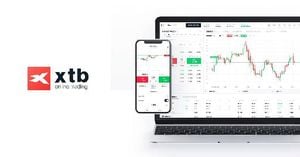Hong Kong has announced a suspension of its express delivery services to the United States, escalating tensions amid an ongoing trade war between Washington and Beijing. The decision, revealed on Wednesday, April 16, 2025, by the Hong Kong government, is a direct response to former US President Donald Trump’s recent actions regarding the "de minimis" exemption for packages sent to the US.
This exemption previously allowed international shipments valued at $800 or less to enter the United States without incurring additional tariffs. However, the Hong Kong government expressed that the United States is enforcing excessive fees, which results in unreasonable costs for residents and businesses in the region.
In a statement, the government declared, "The United States imposes American fees in an excessive manner that causes Hong Kong to pay fees beyond reasonable levels." As part of this new measure, Hong Kong’s express delivery services will cease accepting incoming shipments immediately, and outgoing shipments will be suspended starting April 27, 2025. Notably, this suspension will not affect postal items that are covered by existing agreements.
This retaliatory action means that businesses and individuals in Hong Kong will now have to rely on private shipping companies like FedEx and DHL, which will increase overall shipping costs on top of the American fees. A spokesperson from DHL informed CNN that the company will continue to handle shipments bound for the United States while monitoring the situation closely and assisting customers with the latest changes.
Trump's recent executive order, issued earlier this month, lifted the exemption on goods worth $800 or less imported from China, including those from Hong Kong. The rationale behind this decision was the concern that retailers were using this exemption to bypass import taxes and customs inspections. Under this new directive, packages arriving from China or Hong Kong will face a staggering 120% tariff, amounting to $100 per package starting May 2, which is set to double to $200 by June 1.
Previously, Hong Kong enjoyed a special trade status with the United States, which allowed goods from the city to be subject to lower tariffs and separate customs procedures compared to those imposed on goods from mainland China. However, this special status was revoked by Trump in 2020 amid concerns about the erosion of freedoms and autonomy in Hong Kong.
As tensions between Washington and Beijing continue to rise, Hong Kong finds itself increasingly caught in the crossfire. The city is now subjected to the same tariffs of approximately 145% imposed by the Trump administration on imports from China. Despite this, Hong Kong has opted not to retaliate by imposing similar tariffs on American imports.
John Lee, the Chief Executive of Hong Kong, who was appointed by a committee loyal to Beijing, joined Chinese officials in a strong denunciation of Washington's actions. In a televised address, he stated, "The United States is prepared against China and Hong Kong, using trade as a weapon, which reflects the true face of American hegemony."
Furthermore, Lee announced that Hong Kong intends to lodge a complaint with the World Trade Organization (WTO) regarding the American tariffs, echoing China's previous complaints to the organization about US trade practices. The situation continues to evolve, with both Hong Kong and China seeking to protect their economic interests amid mounting pressure from the United States.
As the trade war intensifies, businesses in Hong Kong are left grappling with the implications of these new tariffs and delivery service suspensions. The reliance on private shipping companies could further burden consumers, who are already facing rising costs of living.
In summary, Hong Kong's decision to suspend express delivery services to the US marks a significant escalation in the trade tensions that have been brewing between the two sides. With both governments taking firm stances, the future of trade relations remains uncertain, and the repercussions are likely to be felt by consumers and businesses alike.
As the situation develops, it is clear that the ongoing trade war will continue to have far-reaching effects on international commerce and the economies of both Hong Kong and the United States.




